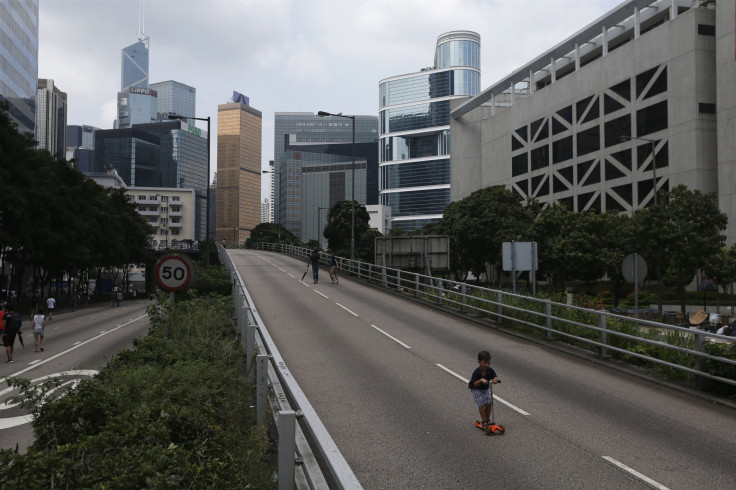Protests Aside, Hong Kong's Status As Financial Center Is Not In Jeopardy

The current protests won’t dislodge Hong Kong from its central role as a top financial market and global business center. The future challenge of Shanghai might, but for now the mass movement that has brought business as usual to a halt hasn't shown signs of threatening Hong Kong's status in favor of regional rivals.
For a city with a reputation as a no-nonsense business hub, the scene in Hong Kong over the last week has been striking: Over a million protesters have fanned out across the territory’s central business district in demonstrations against Chinese interference in Hong Kong’s political affairs. As businesses and shops have closed in the city, the Hang Seng, Hong Kong’s main stock market index, fell 1.9 percent Monday to a three-month low, and tourist traffic from mainland China has also declined.
But even with the recent volatility, as well as intensifying competition from cities like Singapore and Shanghai, economic experts see little sign that the protests threaten Hong Kong’s role as Asia’s largest financial hub for now.
“Hong Kong has very low transaction costs, a very sophisticated financial system, and is highly technically developed,” said Bill Grimes, a professor of International Relations at Boston University. “Geographically, it is a good place for intermediating regional capital flows.”
Despite its self-identification as Asia’s Global City, Hong Kong’s health as a financial center is inextricably linked with China. The territory -- which enjoys significant economic and political autonomy from the mainland -- is the main gateway for foreign direct investment in China and serves as the world’s fifth-largest foreign exchange center, including the largest involving the renminbi, the mainland’s currency. Like Shanghai, Hong Kong boasts a proximity to China’s vast markets, but enjoys significant advantages its mainland cousin doesn’t: a transparent legal system, and an experienced and skilled financial workforce.
The protests roiling Hong Kong have concerned the territory’s basic mechanism for governing itself, a process that the protesters believe should not concern Beijing. In economic terms, though, no constituency has called for the territory to distance itself from the mainland. And while Hong Kong comprises a far lower proportion of China’s GDP with each passing year, the Chinese government has shown little inclination to strangle the territory’s economic growth -- an issue of special concern during the events of the past week. Hong Kong’s business community, too, also tends to support the financial status quo.
“Those who have more influence over Hong Kong’s economy tend to be more supportive of Beijing, because they are aware of the significance of Beijing’s various policies on trade, investment, and tourism to the territory’s future prosperity,” said Beibei Bao, an economist and China expert at the Rhodium Group, a New York-based consultancy.
In 2013, China launched the Shanghai Free Trade Zone, a 20-square-mile area without the same restrictions on foreign investment and trade in the renminbi that prevail elsewhere in China. But one year into the experiment, the zone -- which still denies foreign companies the ability to issue yuan-denominated bonds -- still cannot offer investors the leeway they enjoy in Hong Kong. According to The Diplomat, by this June only 12 percent of the trade zone’s registered companies were foreign -- and fully half were from Taiwan or Hong Kong.
“Because China maintains closed markets and is a young financial system, it just isn’t a major competitor yet,” said Grimes.
© Copyright IBTimes 2024. All rights reserved.












